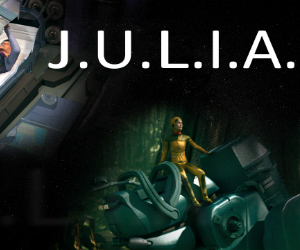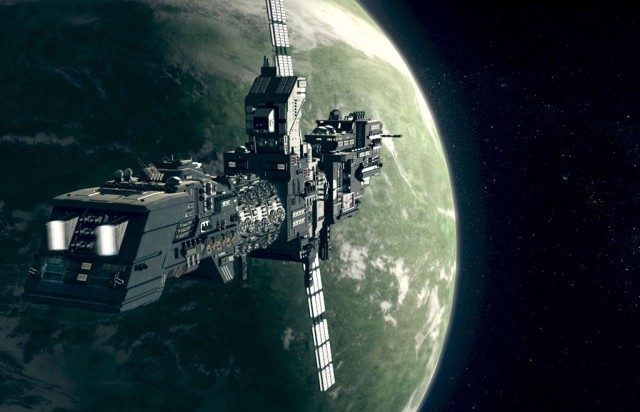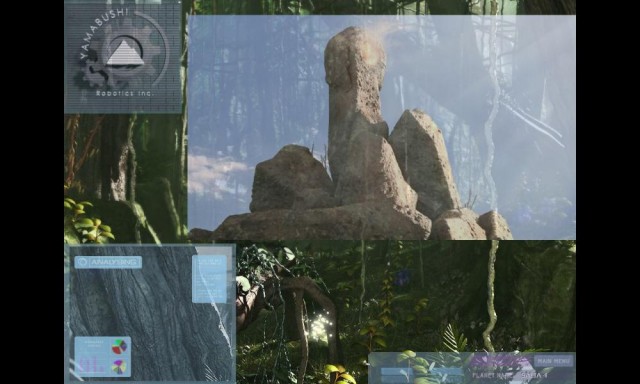J.U.L.I.A. Review
 Game: J.U.L.I.A.
Game: J.U.L.I.A.
Developer: Cardboard Box Entertainment
Publisher: Lace Mamba Global
Available on: Windows PC only
A product of two-man indie development team Cardboard Box Entertainment, J.U.L.I.A is a combination of text-based sci-fi horror adventure and cerebral minigames. Kind of like a cross between Professor Layton and Alien, if you will. It’s aimed at old-school adventure fans who like to mix things up with a little puzzling, and while it never deviates from that noble, if safe, mission, this just makes it focussed, rather than repetitive.
Taking cues from Alien and 2001: A Space Odyssey, J.U.L.I.A begins with its titular A.I. waking the protagonist from cryosleep. As ever in these scenarios, it’s bad news: the space probe that you’re on has been badly damaged by a meteor storm, and the rest of the crew are dead. As astrobiologist Rachel Manners, it’s your job to find out what happened to your crew-mates. To do so, you must fix and upgrade both your ship and its reconnaissance droid Mobot, travel to distant planets and uncover their secrets to find out what happened to the crew, and why.
Switching it on feels a little like stepping back in the ’90s, in a good way. Puzzle, plot and dialogue are punctuated by short FMVs that set the scene, be it an arid desert, a lush forest or a mist-covered mountain planet. For the most part, the interface is composed of a scenic backdrop, a couple of navigational icons, some text and a small animated headshot of the speaker. Since the story is told through dialogue and exposition (there’s a narrator who you can turn off, but he sounds so much like a 1950’s sci-fi serial announcer that anyone with a sense of humour will want to leave him on), the interface doesn’t need to be any more complex.

The story is interesting rather than gripping, and though the script is solid enough, the voice acting betrays the game’s low budget. It’s unfortunate that Rachel is the worst of the bunch, delivering all of her lines in the functional monotone of a children’s educational television presenter. At one point, she remarks that “everyone I ever knew is dead. I now know what it feels like to be completely alone,” in the same tone of voice as one might say “I have returned from the supermarket. However, I seem to have forgotten to purchase milk”. At no point does Rachel manage to convincingly portray someone who has woken up billions of miles and hundreds of years away from everything she has ever known, confronted by the grizzly deaths of her colleagues.
J.U.L.I.A. and Mobot fare better: J.U.L.I.A.’s slick American accent makes sense for an advanced A.I., and Mobot’s synthetic voice, probably generated with a text reader, makes his occasionally subversive statements even more amusing. Still, neither are quite good enough to dispel the feeling that J.U.L.I.A. could have dispensed with voice-acting altogether, since the dialogue is transcribed on screen anyway.
The music fares better. Coming from the Battlestar Galactica school of ethereal “jangliness”, J.U.L.I.A’s soundtrack is an atmospheric delight, which is fortunate, since you’ll be spending a long time listening to it while wrestling with increasingly difficult puzzles. Yes, when it’s not being a text adventure starring a Blue Peter presenter and the Talking Clock, J.U.L.I.A. is a competent puzzler with an impressive variety of challenges. The puzzles begin simply: you’ll start mining for ore on uncharted planets using a simpler, less tactile version of Mass Effect 2’s scanner, then move on to shape-matching puzzles and jigsaws. All are cleanly executed, satisfying and never outstay their welcome. It’s always a risk when a smaller game attempts to offer a range of puzzles rather than build on one solid mechanic, but J.U.L.I.A. happily pulls it off, and the puzzles are one of the main reasons to recommend the game.

Harder puzzles will have you constructing increasingly complex circuits with limited components, scanning the sea floor to find a sunken wreck, and cracking a code where each letter has been replaced with a 2-digit number to read a secret message. Some of these can take a good while to figure out, but they’re fair and logical, so they result in satisfaction, rather than frustration.
As with all these things, the puzzles serve a nominal purpose within the context of the game: helping you find out what happened to Rachel’s crew mates. The “mystery” narrative is a sensible choice in this instance, because it means that the lack of impact you have upon the world, which can sometimes mar adventure games, makes sense, since you’re simply solving clues left long ago. You travel between six planets in a solar system, meeting wise old aliens and exploring the wreckage left by various scouting parties. As you may imagine from the game’s title, J.U.L.I.A. plays a pivotal role in events. The official website describes her as “the most temperamental artificial intelligence ever designed”, and while she never quite lives up to that promise (at least not if you’ve seen or read any science fiction, ever), the story still trundles along nicely.
The text-based sections are well-written, and complement the Wintermute Engine’s attractive interface nicely. As you explore the solar system, you’ll find yourself on the trail of ancient legends and lost civilisations forever changed by their contact with humans. Though the game isn’t pompous enough to make great statements about the nature of mankind, the story frequently touches upon humanity’s inability to confront the unknown with any kind of restraint or humility.
VERDICT: J.U.L.I.A. is a well-edited game with a clear vision that keeps you interested by perpetually adding tissue-thin layers of complexity to a lean frame. It doesn’t do anything new or spectacular, but then, it doesn’t need to. What it does do is combine tried-and-tested elements – cerebral puzzling, text-based exposition, FMV sequences and a “last human” sci-fi yarn – to form a pleasing, cohesive whole. If you’re a nostalgic adventure gamer looking for a quirky title to while away a few evenings, J.U.L.I.A. is definitely a good choice.






